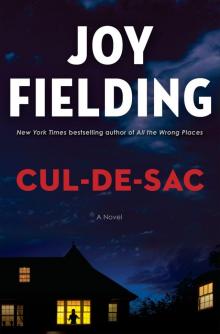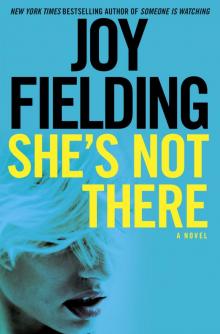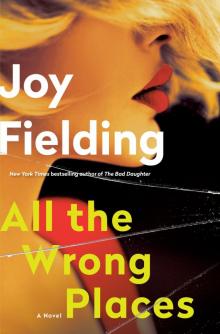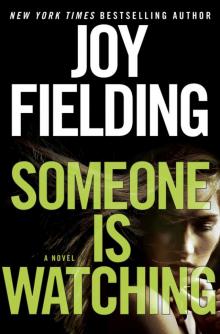- Home
- Joy Fielding
When I Looked Away Page 19
When I Looked Away Read online
Page 19
“What kind of jobs? Who have you seen? Where are they? Come on, details, details.”
Gail forced a smile. “I’ve seen so many people about so many different types of jobs . . .”
“Such as?”
“Secretary, receptionist . . .”
“I didn’t know you could type or take shorthand.”
“I can’t,” Gail laughed. “Maybe that’s why I’m not having any luck.”
“Tell me about your weekend.”
Gail caught a momentary glimpse of Jack, his nude body covered with the crumpled bed sheet, his shoulders slumped, his posture defeated. “It was fine,” she said. “Cold. Very cold.”
“Whatever happened to Indian summer?” Laura wondered aloud.
“There’s Nancy,” Gail said abruptly, pointing through the crowd toward the head table where Nancy Carter was stepping up to the microphone.
There were a few more minutes of frenzied conversation before everyone quieted down and allowed Nancy to speak. Nancy was resplendent in a bright red taffeta blouse and black skirt. Understatedly overpriced, Gail thought. When Nancy began to speak, her voice was steady and strong.
“She missed her calling,” Laura muttered as Nancy finished her welcoming speech and admonished them all to begin lunch and enjoy the show. “She should have been Queen.”
“She looks great,” Gail said.
“That awful black dye,” Laura winced. “She must have had a fresh onslaught of gray.” Laura began digging into her fresh fruit salad, and the rest of the women at their table did likewise.
The fruit cocktail was followed by a delicate salmon mousse, framed by asparagus and small white potatoes. Judging from the minuscule portions, the chef evidently assumed all women who came to fashion shows were on a diet.
The waitress cleared away the plates and there followed a bright pink sherbet which one of the women explained loudly was actually a sorbet. Gail thought they looked exactly the same and tasted the same. She took one spoonful and then put the spoon down. She noticed that after several mouthfuls Laura did likewise.
Suddenly, the lights dimmed and the by now familiar rock music that accompanied most fashion shows began blasting from the speakers. A spotlight appeared boldly, then another and another, and at once there were three gorgeous women parading down the runway in next spring’s fashions.
The models pranced, hips first, shoulders swaggering, back and forth before their rapt audience. Gail watched their smiles flash on and off, listened to the blare of the music and grew increasingly depressed. How could they be modeling next spring’s fashions already?
As suddenly as the show had begun, it ended. Not that the finale was anything less than spectacular, consisting as it did of two live cheetahs being led growling down the runway by a stunning, darkhaired model whose dress was of a similarly bold pattern. Gail wondered if the animals might not suspect some sort of double-dealing and rebel, leaping off the platform and helping themselves to an impromptu lunch of their own, but, despite their growls, they were disappointingly calm.
“Last year’s Oscar De La Renta,” one woman scoffed, and another agreed as the lights came on again.
“I saw the same thing two years ago at Valentino’s,” the woman who had to serve on jury duty announced. “And that model with the cats—she looked like something the cats dragged in.” She laughed at her feeble joke.
“What can you expect from a designer from Hackensack?”
“Hackensack? You’re kidding!”
“Apparently, he runs a very successful store there.”
“Well, you won’t find me in it,” another woman said, and the others agreed.
Nancy Carter approached the table, glowing with expectancy. “Well, what did you think?”
“Great,” said the Oscar De La Renta fan.
“Beautiful clothes,” the refugee from Valentino’s announced to a general hum of agreement.
“What did you think of the last model?” Nancy asked her. “The one with the cats.”
“Gorgeous,” she answered without so much as a pause.
“My daughter,” Nancy laughed, her voice an interesting mix of pride and envy. “My daughter, the model.”
“I had no idea Sloane was so grown up,” Gail said out loud.
Nancy turned in her direction, aware for the first time that Gail was there. The color all but drained from her face. “My God, Gail, I didn’t know you were coming.” She looked accusingly at Laura. “Laura, you never told me you were bringing Gail.”
“I wanted to surprise you.”
“How are you, dear?” Nancy asked, her eyes begging for a simple “fine.”
“All right,” Gail told her.
“You look wonderful,” Nancy said, an obvious lie. “I’m so glad that you could make it. Why haven’t you called me? I’ve been so worried about you!”
Gail shrugged. What could she say?
“How’s Jack?” Nancy asked, smiling at a woman at the next table.
“Okay,” Gail answered. “Jennifer too.”
“Good,” Nancy said, starting to inch away. “That’s good. I think you’re amazing, all of you. I really do.” She took a deep breath, as if the effort of what she had just said had been too much.
“You’re full of shit,” Laura told her as sweetly as if she’d just said how nice she looked.
Gail watched Nancy’s face in surprise. It registered nothing. She hadn’t heard. She hadn’t heard because she didn’t listen. “I’ve got to run,” Nancy apologized happily. “You know what it’s like being hostess. I have to make sure that everyone’s happy.” She turned back to Gail, allowing their eyes to connect for only several seconds before looking away. “Listen, you be sure to call me if you need me, do you hear? If there’s anything I can do, anything that you need . . .” She moved on to the next table without completing the sentence.
How could I ever have believed that woman was my friend? Gail wondered sadly.
“You used to find her amusing,” Laura said, reading her mind. “Come on, we’d better go.” Laura pushed her chair away from the table. “I have to get back to work.”
*
“Are you very busy?” Gail asked as Laura was driving her home.
“The usual. Alcoholics, wife beaters, incest. A social worker’s life is not a happy one.”
“Incest?”
“Yes, right here in River City,” Laura chuckled. “You look genuinely shocked. Didn’t you think we did that sort of thing in New Jersey?”
“I can’t imagine doing it anywhere,” Gail said honestly.
“Then you’re very much behind the times, my dear. Conservative statistics estimate one in ten boys and one in four girls will be molested before they reach maturity. It’s an epidemic.”
Gail was beginning to feel sick to her stomach. “But how can a grown man be sexually interested in a child?” she asked weakly. If Laura realized that Gail was no longer referring to the files of nameless statistics that crossed her desk every week, she made no show of it, her concentration on the traffic, her mind slowly being taken over by her professional persona.
“You’d be surprised how flirty some of these five- and six-year-old girls can be,” Laura told her matter-of-factly.
“Laura!” Gail gasped.
Laura suddenly realized all the implications of her remark and pulled her car over to the side of the road. “Hey now, wait a minute. What are we talking about here?” she demanded, turning in her seat to face Gail head-on. “I was not talking about Cindy—”
Gail didn’t let her finish. “It doesn’t matter who you were talking about,” she exclaimed. “Did you hear what you said? You said that five- and six-year-old girls are flirty!”
“Some of them are,” Laura defended herself shakily. “Look, Gail, you don’t know. You don’t see what I do. In my office every day, families come in, all torn apart. I see this little prune of a wife who puts out for her husband maybe twice a year when she has to, and I see a l
ittle girl openly flirting with her father. A lot of men aren’t strong enough to resist—”
“They damn well better resist,” Gail shot back, tears springing to her eyes. “They damn well better stop using their wives as an excuse, and start assuming their responsibility as adults! If they need other women, let them find them! Women! There are plenty of available, willing ones around. A man doesn’t have to turn to a defenseless child who doesn’t have any choice in the matter!” Gail found herself twisting her body wildly from side to side. “Listen to you,” she cried. “You’ve bought the whole phony bill of goods. If there’s a problem with society, don’t look to the perpetrator, look at the victim! Don’t put the blame where it belongs; put it where it’s easiest to disregard. Blame it on the women! If a man rapes his fiveyear-old daughter, blame his frigid wife. Blame his ‘flirty’ child. God forbid we place the blame on the man responsible!”
“Gail, calm down. I didn’t mean to imply—”
“I am appalled,” Gail continued, unable to stop herself, “that you, an intelligent woman, would believe that a five-year-old girl has any overt knowledge of her sexuality, that she would be seeking anything but affection from a man, especially if that man is her father. I am sickened by how easily you allow that man to relinquish his responsibility to his child. To all children. A child cannot make the same kind of rational decisions that an adult can. A child looks to a grown-up for guidance. A child trusts the adult to provide it. We allow that adult to subvert and destroy that trust and then we blame the child? What is going on in this world? What are we doing to our children?”
Gail lowered her head to her lap and wept. After several minutes she became aware of a hand stroking her back.
“I’m sorry,” Laura said softly. “I wasn’t thinking.” Gail kept her eyes closed. She sensed Laura wasn’t finished, that a “but” hung in the air between them. “But,” Laura continued, her voice unsteady and unsure, “you have to learn to put things in perspective. You can’t keep relating everything that happens to what happened to Cindy.”
“I read the papers every day, Laura,” Gail whispered. “I see case after case where the victim ends up shouldering the blame. I listen to people talk, people like you who are well-meaning, good people, and I hear what you say, and you say the same thing—that the victim is somehow responsible for the crime. And the guilty parties walk away with suspended sentences or a slap on the wrist, and I am terrified, terrified, that the police will one day catch that monster who killed my baby and they will bring him to trial and he will get up there on the stand and say that my little girl, my baby, enticed him into those bushes, that it was all her fault she died, and they’ll let him go.”
“They won’t let him go,” Laura said with a certitude that Gail envied. “He’s obviously a very sick man. They’ll put him away somewhere. They won’t let him go.”
Put him away somewhere, Gail repeated to herself. Put him away. He’s obviously a very sick man.
“In the meantime,” Laura continued, “you’re the one we have to worry about.” She paused. “I want to be very careful how I phrase this. Please don’t misunderstand . . . There’s a tendency at times like this to glorify the deceased, to turn the person who died into a saint, to change him or her into something that . . .”
Gail looked up from her lap in slow horror. “The deceased,” she spat contemptuously, “was my six-year-old daughter, not some anonymous him or her, and, if I want to remember that while she was alive she was a constant joy to be with—”
“Gail, slow down. That’s exactly what I mean. ‘A constant joy to be with,’ you just said. Gail, I can remember days when you were at your wit’s end with that child, when I’d call you and you’d be begging for five minutes of free time—”
“Shut up!” Gail shrieked, her frustrations pouring out and frightening Laura into silence. “Is this the kind of counseling you give to people? Is it? Reminding a woman whose child has been raped and strangled that she occasionally wished for five minutes of time to herself? That she was as human as her child? That because the child wasn’t always perfect and sometimes got on her mother’s nerves, that the mother, that I, should think any the less of her? Are you really so insensitive, Laura? Are you really so goddamned stupid?”
The two women sat beside each other as if they were strangers. For a long while neither said a word.
Then Laura spoke, her voice and hands trembling. “I don’t understand what’s happened here, how we got to this point. I didn’t mean to imply those things. I just wanted you to—”
“See things the way you think I should?”
“No, not that at all. I know how upset you are, and I recognize that you’re probably still reeling from that scene with your mother-in-law. But this is me, Gail. I’m your friend and I love you. Don’t you understand?”
“Don’t you understand,” Gail retorted angrily, “that I would trade any of my so-called friends, including you, especially you,” she emphasized, “a thousand times over for just five minutes with the daughter I lost?”
Both women let their eyes drop and turned slowly to face the windshield. They said nothing, each lost in the realization that there was nothing left to say.
Chapter 22
Gail sat on the old, lumpy mattress of the single bed in her room at 26 Barton and thought about the events of the last few days.
Everything was falling apart. The facade she had worked so hard to erect was starting to crumble around her. She was fighting with everyone, first her mother-in-law, then Laura. This morning there had been yet another squabble with Jennifer that had led to yet another confrontation with Jack. Over what this time? she asked herself, trying to remember the order of things.
“Laura called again last night,” Jennifer had said, and then continued when Gail said nothing. “Why won’t you speak to her, Mom?”
Gail continued to sip at her coffee, saying nothing. She noticed Jack look up from behind the morning paper.
“Why won’t you speak to her?” Jennifer had asked again.
“Laura and I had a slight disagreement.”
“What about?”
“Nothing important.”
“Then why haven’t you spoken to her all week? Why won’t you take any of her phone calls?”
“What’s this about Laura?” Jack asked.
“It’s nothing,” Gail repeated.
“Sounds pretty serious if you’re not talking.”
“What happened, Mom?”
“Really, Jennifer,” Gail said loudly, “it’s none of your business. If I wanted to tell you, I would. Now drop it. Please,” she said, lowering her voice.
“I’m late for school.” Jennifer let her fork fall noisily to her plate of unfinished scrambled eggs and jumped to her feet.
“Jennifer,” Jack began, “you have plenty of time. Sit down. I’ll drive you—”
“No thanks,” Jennifer told him, and hurried out of the room. Seconds later, they heard the front door slam shut.
“You don’t think you came down on her just a little hard?”
Gail ran her hands through her hair, feeling it in need of a good wash. “I’m sorry. I didn’t mean to. I’ll talk to her later.”
“What happened between you and Laura?”
“Nothing.”
“The same nothing that happened between you and my mother?”
“When were you speaking to your mother?”
“She’s very upset,” he told her, not answering her question.
Gail took a deep breath, recalling the older woman’s startled expression as Gail had hustled her angrily to the front door. “I’ll have to apologize,” Gail said almost under her breath.
“What happened, Gail? What’s happening? Can’t you talk to me about it?”
I wish I could, Gail thought. “There’s nothing to say,” she said aloud. “It’ll work itself out.”
“I’m not so sure.”
Gail shrugged, not wanting to argue.
“And this thing with Laura? Will it straighten itself out too?”
She hadn’t answered, and eventually Jack had tired of waiting and left the table.
What about Laura? Gail now wondered. A friendship of such long standing shattered in so few minutes. How could Laura have said those things to her? How could she have said those things to Laura? Laura, who had always been there when she needed her, who had cried with her, laughed with her, tried so hard to help her. A real friend, she thought, simultaneously thinking of Nancy, not a friend at all. Interesting the insights that tragedy could provide, she mused.
Now they were both gone, Gail realized. The true friend and the false one. In the end, what difference did it make? Her other friends had stopped calling, stopped asking her and Jack over. They’d been refused too often. People get impatient, she heard the woman from the group meeting repeat silently.
It didn’t matter, she thought, remembering how she had always valued these relationships. She could do without friends. If she had to learn to live without her child, she could certainly learn to live without her friends.
Gail looked around the stark, white room. Of all the rooms she had inhabited, and in the last few days she had moved three times, this one was the most prisonlike. It was tiny, the size of a large walkin closet. Its cracked walls were dull white; the narrow bed was covered with only a thin, faded blanket of indeterminable color. There was no chair, and only a bare overhead light. The dresser consisted of three beat-up shelves. The landlord, a squat middle-aged man with a noticeable paunch, had given her no instructions nor issued any restrictions on her behavior. As far as he was concerned, she could smoke in bed, drink in the halls or shoot up on the stairs. The rent was twelve dollars a night.
The boarders in this establishment were not much different from the roomers in any of the other houses she had stayed in. She had not been in this place long enough to meet anyone, had not even seen anyone except for an obviously deranged young man who lived on the main floor and apparently never left the house. He had the slightly unnerving habit of yelling “Into the trenches!” whenever anyone walked through the front door.

 The Stranger Next Door
The Stranger Next Door Cul-de-sac
Cul-de-sac The Final Act
The Final Act When I Looked Away
When I Looked Away She's Not There
She's Not There All the Wrong Places
All the Wrong Places Now You See Her
Now You See Her Don't Cry Now
Don't Cry Now Good Intentions
Good Intentions Still Life
Still Life Lost
Lost The First Time
The First Time Whispers and Lies
Whispers and Lies The Other Woman
The Other Woman Charley's Web
Charley's Web Mad River Road
Mad River Road Puppet
Puppet Life Penalty
Life Penalty The Wild Zone
The Wild Zone Home Invasion
Home Invasion Someone Is Watching
Someone Is Watching Heartstopper
Heartstopper See Jane Run
See Jane Run The Bad Daughter
The Bad Daughter Shadow Creek
Shadow Creek Missing Pieces
Missing Pieces Kiss Mommy Goodbye
Kiss Mommy Goodbye Grand Avenue
Grand Avenue